Edie Melson's Blog, page 105
December 10, 2022
God Knows What Writers Don’t

by Martin Wiles @RiverBendSagas
God knows what writers don’t, and I’m glad.
One day while sitting at my desk, I received a text from my wife. It read, “I want to go to the mountains.” Since our anniversary was in a couple of weeks, I thought of the train—a two-for-one deal.
Once again, we headed to Bryson City, North Carolina, to board the Great Smoky Mountain Railway and make a short trip to Dillsboro, North Carolina.
Rain fell on and off on our journey to the train station and as we rode the train. But the clouds briefly broke when we arrived in Dillsboro. We visited a small tavern, ordered burgers and fries, and watched as the almost nine hundred other people on the train milled about restaurants and shops.
Before we knew it, the one-and-a-half-hour layover ended, and the conductor blew the whistle to board. The ride back was as peaceful as the ride over.
When we arrived in Bryson City, we were anxious to deboard. The next day was Sunday—a busy day for us. As the train crawled to a stop, passengers in the neighboring car made their way through our car to deboard. We stood and joined the line. But no call came to deboard.
Railway personnel paced up and down outside the long line of cars, cautioning passengers not to dangle their arms out the windows or try to deboard. I wondered why. After fifteen minutes of standing, we found out.
We heard the “toot, toot” of the old steam engine before we saw it. It made its way close to the train as it unhooked from one end and moved to the other end. I could have reached out and touched it. Now, I knew why we couldn’t get off. The railroad workers knew what we didn’t. Injury or death awaited any who disobeyed their orders.
After being sold by his brothers, sold into slavery, falsely accused of rape, and thrown into prison for two years, Joseph determined God knew what he hadn’t known for the last thirteen years. His plight was a part of God’s plan to save his family from starving to death during a famine.
“So it was God who sent me here, not you (Genesis 45:8 NLT)!
As we writers live life and pursue our calling, we may not understand why many things happen or don’t happen. Why did the agent select the other person to represent instead of me? Don’t I have more experience and followers? Why did so and so get the manuscript contract? He didn’t even have to secure an agent. Why did a publishing company contact her about an in-house book? Or why did the editor contact her for a writing assignment and not me?
But if we walk by faith, we can believe God is working behind the scenes, forming us into the image of his Son and guiding us to carry out his specific plan for us. We don’t see the end, but he does. Perhaps we only needed to write the manuscript for our personal catharsis. Maybe our family and friends were the ones who really needed to read our self-published book. Or perhaps just one person needed to see our devotion.
Although our writing journey may include things we consider “not good,” it becomes good when we allow God to take us where he wants us—emotionally and spiritually.
When your writing journey—or just life in general—isn’t making sense, trust that God knows what you don’t know.
TWEETABLEGod Knows What Writers Don't, insight from author Martin Wiles, @LinesFromGod on @EdieMelson (Click to Tweet)
 Martin Wiles is the founder of Love Lines from God (WWW.LOVELINESFROMGOD.COM) and serves as Managing Editor for Christian Devotions, Senior Editor for Inspire a Fire, and Proof Editor for Courier Publishing. He has authored six books and has been published in numerous publications. His most recent book, DON'T JUST LIVE...REALLY LIVE, debuted in October of 2021. He is a freelance editor, English teacher, author, and pastor.
Martin Wiles is the founder of Love Lines from God (WWW.LOVELINESFROMGOD.COM) and serves as Managing Editor for Christian Devotions, Senior Editor for Inspire a Fire, and Proof Editor for Courier Publishing. He has authored six books and has been published in numerous publications. His most recent book, DON'T JUST LIVE...REALLY LIVE, debuted in October of 2021. He is a freelance editor, English teacher, author, and pastor.Featured Image: Photo by Marko Mudrinic on Unsplash
Published on December 10, 2022 22:00
December 9, 2022
Writers, One Word Makes All the Difference
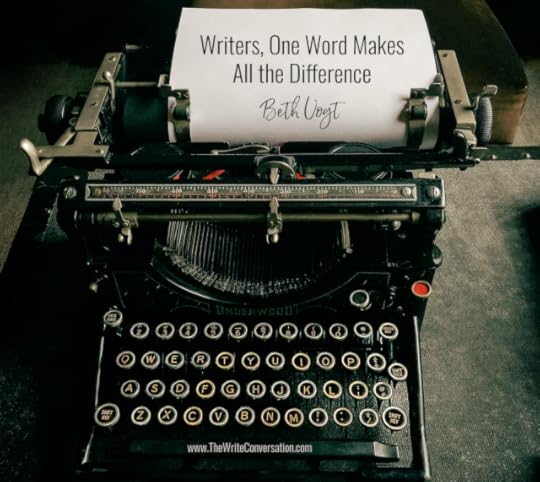
by Beth K. Vogt @BethVogt
There are 21 days left in 2022. Three weeks that are going to go by in a blur of holidaze and fa-la-la-la-la.
While we’re juggling everything—visits with family and friends, celebrating the birthday of Jesus, and all the extra stuff that happens this time of year—some of us have writing commitments too, which add another layer of fun (ahem!) to the last few weeks of the year.
Is anyone also pondering personal or professional resolutions for 2023?
Stop.
I know a lot of the “everything” isn’t optional, especially if you’re on a writing deadline during the holidays. What I’m suggesting you stop doing is the whole resolution thing. New Year’s resolutions sound good in January. Making the “I will” and “I won’t” list seems so positive—until you lose the list in February and can’t remember half of the things you wrote down.
But what’s the alternative to starting the new year off right with a list of goals?
Consider choosing One Word for 2023. This will be my 18th year choosing One Word to focus on for 365 days—and never once have I lost track of what word I chose as the days, weeks, and months progressed. You can misplace a list of resolutions, but one word? Almost impossible to misplace. Even more important, God uses the process to change me in significant ways that influence all areas of my life.
Some of my One Words have been: GratitudeHopeKindnessTrustConfidenceInheritance
Last year, my One Word was “pray” – the verb, not the noun “prayer,” because praying is active. This quote by Mother Teresa inspired me: “God speaks in the silence of the heart. Listening is the beginning of prayer.”
There have been two occasions when I’ve repeated One Words. I repeated the One Word “forgiveness” and the One Word “listen” because as I mulled over my One Word for the coming year, God didn’t move me past the One Word I had. Interestingly, I’m repeating “pray” for 2023 for the same reason.
Interested in trying One Word in the new year? Here are four tips:Pray about your One Word. God usually provides me with a scripture verse that anchors me to my One Word.Be attentive for a visual. I’ve used a photo or some sort of graphic to remind me of my One Word. I’ve also worn a necklace or bracelet engraved with my One Word. Dive into your One Word. Consider reading books related to your One Word. This year I read 100 Prayers Every Christian Should Know. I also posted quotes about prayer on my Instagram feed once a week. The year I focused on the One Word gratitude, I incorporated a gratitude journal. Read My One Word by authors Mike Ashcraft and Rachel Olsen. This is a helpful resource to learn how to choose One Word. I also recommend checking out their website. It’s motivating to see One Words other people have chosen.
I’d love to know about your experience if you already choose to focus on One Word each year or why you prefer to do resolutions.
TWEETABLE Writers, One Word Makes All the Difference, Insight and Tips from @BethVogt on @EdieMelson (Click to Tweet)
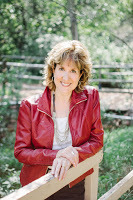 Beth K. Vogt believes God’s best often waits behind the doors marked “Never.” Having authored nine contemporary romance novels and novellas, The Best We’ve Been, the final book in Beth’s Thatcher Sisters Series with Tyndale House Publishers, releasers May 2020. Other books in the women’s fiction series include Things I Never Told You, which won the 2019 AWSA Award for Contemporary Novel of the Year, and Moments We Forget. Beth is a 2016 Christy Award winner, a 2016 ACFW Carol Award winner, and a 2015 RITA® finalist. An established magazine writer and former editor of the leadership magazine for MOPS International, Beth blogs for Learn How to Write a Novel and The Write Conversation and also enjoys speaking to writers group and mentoring other writers. Visit Beth at bethvogt.com.
Beth K. Vogt believes God’s best often waits behind the doors marked “Never.” Having authored nine contemporary romance novels and novellas, The Best We’ve Been, the final book in Beth’s Thatcher Sisters Series with Tyndale House Publishers, releasers May 2020. Other books in the women’s fiction series include Things I Never Told You, which won the 2019 AWSA Award for Contemporary Novel of the Year, and Moments We Forget. Beth is a 2016 Christy Award winner, a 2016 ACFW Carol Award winner, and a 2015 RITA® finalist. An established magazine writer and former editor of the leadership magazine for MOPS International, Beth blogs for Learn How to Write a Novel and The Write Conversation and also enjoys speaking to writers group and mentoring other writers. Visit Beth at bethvogt.com.Featured Image: Photo by mk. s on Unsplash
Published on December 09, 2022 22:00
December 8, 2022
A Different Perspective this Christmas
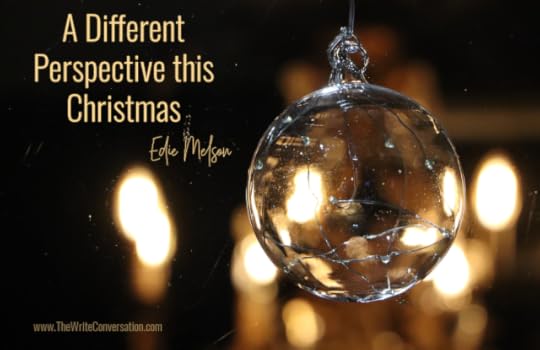
by Edie Melson @EdieMelson
I’ve always celebrated Christmas as the time of Jesus’ birth. It’s a joyful time—after all, when is the birth of a baby not a reason to celebrate? It’s marked with angel choruses, gifts of the magi, and celebration to end all celebrations.
In contrast, I’ve always approached Easter as a more somber time—certainly a time of ultimate triumph. But one that was preceded by the agony of Jesus on a cross. To me, Easter was when Christ laid down His life for us.
Now I’ve begun to look at things a little differently.
Recently, I challenged by a friend to view Christmas in a new light. She pointed out that His birth on earth was when Jesus left His Heavenly glory.
The more I considered this, the more sharply I saw the contrast of His life in Heaven. I had always looked at Christmas as a gift—which it is—instead of seeing past the present to the sacrifice it must have been. Jesus’ birth truly was the time when He laid down His life for us.
These are my thoughts on what Jesus really sacrificed by coming into this world:He exchanged Heavenly robes for swaddling garments of ragged cloth.He exchanged the chorus of angels praising him day and night with the voices of cattle in a lowly manger.He exchanged the power and authority of being God in Heaven with that of living as a helpless—fully human—baby.He exchanged the protection of angels with the dubious protection of human parents.He exchanged immortality with a life that would end in physical death. (Yes, He was fully resurrected, but He had to go through the process of living to dying to reconcile us with God).He exchanged perfect—intimate—fellowship with God for a relationship with us.
I will never see Christmas the same way again. How about you?
Greater love has no one than this, than to lay down one’s life for his friends. John 15:13
Who, being in very nature God, did not consider equality with God something to be used to his own advantage; rather, he made himself nothing by taking the very nature of a servant, being made in human likeness. And being found in appearance as a man, he humbled himself by becoming obedient to death—even death on a cross! Philippians 2:6-8
TWEETABLEA Different Perspective this Christmas, insight from author @EdieMelson (Click to Tweet)
 Edie Melson is a woman of faith with ink-stained fingers observing life through her camera lens. She’s a writer who feels lost without that device & an unexpected speaker who loves to encourage an audience. She also embraces the ultimate contradiction of being an organized creative. She knows the necessity of Soul Care and leads retreats, conferences & workshops around the world on staying connected to God. Her numerous books, including the award-winning Soul Careseries & reflect her passion to help others develop the strength of their God-given gifts. Her blog, The Write Conversation is recognized as one of the top 101 industry resources.
Edie Melson is a woman of faith with ink-stained fingers observing life through her camera lens. She’s a writer who feels lost without that device & an unexpected speaker who loves to encourage an audience. She also embraces the ultimate contradiction of being an organized creative. She knows the necessity of Soul Care and leads retreats, conferences & workshops around the world on staying connected to God. Her numerous books, including the award-winning Soul Careseries & reflect her passion to help others develop the strength of their God-given gifts. Her blog, The Write Conversation is recognized as one of the top 101 industry resources. She and husband Kirk have been married 40 years and raised three sons. They live in the foothills of the Blue Ridge Mountains and can often be found hiking—with Edie clinging to the edge of a precipice for the perfect camera angle and Kirk patiently carrying her camera bag and tripod. Connect with her on her website, www.EdieMelson.com and through social media.
Published on December 08, 2022 22:00
December 7, 2022
Using the Memories of Christmas Past to Write More Powerfully Today

by Julie Lavender @JLavenderWrites
"For it is good to be children sometimes, and never better than at Christmas, when its mighty Founder was a child Himself." –Narrator, A Christmas Carol
My senior year of high school, I was selected to direct the Christmas play, A Christmas Carol. Proceeds from the play’s admission would be used to continue funding the honor society that I was part of. As director, I had the privilege of selecting the participants of the play after auditions.
I don’t remember much about the productions, but I do recall choosing the 6’2” star football player to play the part of Tiny Tim. Karl, popular, outgoing, and friend to all, proved to be the perfect choice.
Memories of past Christmases, especially those so long ago, seem to meld and blend into a blur. Specific gifts are long forgotten, except for that one year that I got a crimson-colored Honda Trail 70 that I promptly named Red Hot Smiley for some odd reason. Knowing my parents couldn’t afford that expensive gift, I treasured my new mode of transportation even more. As a middle schooler, however, my traveling buddy only accompanied me to the back fields of our eighty-acre farm.
What I remember most about Christmases of the past are the people—family and friends and strangers that I helped buy gifts for. Smells—fruit cakes baking, ambrosia marinating, divinity simmering, butterscotch boiling, cedar needles breathing, and peppermint melting. Sights—twinkling lights, wreathes adorning windows, fake snowmen on the lawns of my south-Georgia friends, poinsettias that matched the choir robes, packages decked out with bows, and tinsel glimmering with each flashing oversized bulb. And sounds—favorite seasonal tunes, Christmas cantatas, and those treasured words of Luke spoken from the pulpit.
Nothing elicits memories of Christmas past quite like a current Christmas.
As writers, we can give ourselves a gift by journaling Christmas memories as they pop up throughout the month. If you’re like me, when those memories flash through your mind, you’re certain you’ll remember that event or happening or emotion the next time you sit down to write a Christmas article or devotion. But if you’re also like me, that won’t be the case.
Keep a notebook in the car, a small one in your purse, a notepad on the coffee table, along with a pen in each place, too. Whenever a new, fresh Christmas thought tickles your senses and conjures up memories of the past, jot down what you remember at that moment. If you have time, close your eyes and sink back into the memory, penning all of the thoughts and images that appear.
When a classic Christmas song plays on the radio, drift back to the days of vinyl records and Perry Como’s smooth tone and Elvis Presley’s distinguishable voice. Let the scent of gingerbread take you back to those days of creating masterpiece houses, decked out in candy décor, with the kids or grandkids. When you hear the ringing of a Salvation Army bell, let your mind wander to mission projects and service projects and helping someone in need during the holidays.
With the onset of a snowstorm, think back to your coldest Christmas and warmest Christmas. Are you blessed to wake up to a white Christmas often? Only once for this southern girl, because an inch-and-a-half still counts! What did your most creative snowman look like? Who won the most sled races in your family?
How about Christmas miracles? Pay attention to the stories of friends and family, as miracle recognition seems to be heightened during the time of our Savior’s birth. Journal details of their stories for possible use at a later time in an article or blogpost, with their permission, of course.
But most importantly, dwell on the Founder of Christmas: the newborn babe, the toddler greeted by kings, the young boy teaching in the Synagogue, the young man doing carpentry work beside His father, the Disciple Maker, the Miracle Worker, the compassionate friend, the Storm Calmer, the Provider, the Healer, the One who hung on the cross, and the One who rose again. The Savior of the world and the greatest gift we’ll ever receive.
Keep Jesus in the forefront of your mind throughout the holidays and write down every thought that comes to mind about His goodness and mercy and grace and love.
This season, make the most of past Christmas memories by storing them away on your laptop or notebook, not just the back of your mind. Include memories of all five senses and include emotions, too. Then, fast-forward a few months when it comes time to write a Christmas article or post, you’ll have lots to pull from.
What about you? Have you written about a favorite Christmas memory?
TWEETABLEUsing the Memories of Christmas Past to Write More Powerfully Today, insight from author @JLavenderWrites on @EdieMelson (Click to Tweet)
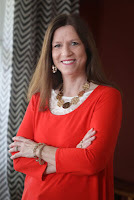 Julie Lavender loves celebrating lots of holidays, not just the “big” ones on the calendar. She finds that it’s hard to remember details if she doesn’t write them down. And then, she occasionally loses the notepad with the memory, but that’s another story for another day. Julie is the author of Children’s Bible Stories for Bedtime (and hopes you’ll check out the new hardback edition) and 365 Ways to Love Your Child: Turning Little Moments into Lasting Memories.
Julie Lavender loves celebrating lots of holidays, not just the “big” ones on the calendar. She finds that it’s hard to remember details if she doesn’t write them down. And then, she occasionally loses the notepad with the memory, but that’s another story for another day. Julie is the author of Children’s Bible Stories for Bedtime (and hopes you’ll check out the new hardback edition) and 365 Ways to Love Your Child: Turning Little Moments into Lasting Memories.
Published on December 07, 2022 22:00
December 6, 2022
The Why and How of Creating Conflict in the Stories We Write
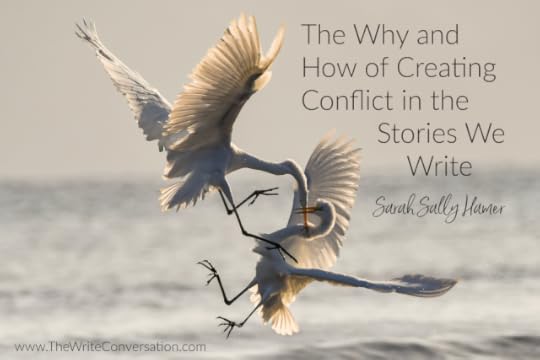
by Sarah Sally Hamer @SarahSallyHamer
Have you ever fallen in love with one of your characters and don’t want them to suffer? So you create a story where everything goes right, over and over and over. The boy gets the girl and they live happily ever after. Or the guy catches the fish and everyone has a good dinner. Or the knight (or knight-ess) kills the dragon and everyone goes home.
How is that working for you?
The problem is, that’s not what STORY is all about.
STORY (and I’m capitalizing it to make sure you know it’s important!) is about conflict. STORY is about obstacles and heartache and determination and persistence and lessons and new understandings. Yes, eventually, it’s about cooking the fish or killing that dragon. But it also has to be a journey of discovery by a character.
It has to be about conflict!
Would you change anything in your own life if you were perfectly happy? Probably not, right? Then why would you expect a character to make a major change if they weren’t forced into it? It wouldn’t happen. And that’s boring.
“But I don’t want to be mean to my characters! I love them!” I’ve heard that many times, mostly as a writer is backing away from me. Well, I love my characters too! But if we don’t force them to grow and change, they will never be happy. If it’s too easy for them, they will just keep on with what they are doing.
Is that really what we want for our characters? They almost become real people in our minds, don’t they? In fact, one of my favorite authors, Roberta Gellis, wrote an amazing Medieval series years ago, where she had the same characters throughout. She told me once that she had to stop that series and start with something else because her main characters were getting too old to be believable and she would NOT kill them off. In fact, she said that they were so real to her that she could believe that they were living in Ohio somewhere (she was from New York), having a happy life, as long as she didn’t write about their deaths. I completely understand! I loved her characters too!
But we have to push them into becoming better people. They wouldn’t be unique and wonderful if they never went through the growth process, better known as a character arc.
So, how do we do that?
First, we have to make sure they want something they can’t have at first. They have to want it badly enough to make a life change. Jack Nicholson’s character in As Good as It Gets wants to be left alone in his misery. But he has to interact with people, whether he wants it or not. So, he finds someone (Helen Hunt playing Carol the waitress) who is willing, although reluctant, to work with him. But she has family problems that she can’t solve. So, Jack has to change his ways and start doing things he doesn’t want to—in so many words, to suffer!— to be able to get what he wants. But he learns, slowly, that he needs her, so he finally takes the steps he needs to so he can “be a better man” and make her happy. He doesn’t want to change—actually sees no reason to do so—but, once he realizes she is willing to try, he is too. Conflict! Being mean to him! Change! Growth! Happy!
And the reader is happy too.
Do you have trouble being “mean” to your characters? Why?
TWEETABLEThe Why and How of Creating Conflict in the Stories We Write, tips from @SarahSallyHamer on @EdieMelson (Click to Tweet)
 Sarah (Sally) Hamer, B.S., MLA, is a lover of books, a teacher of writers, and a believer in a good story. Most of all, she is eternally fascinated by people and how they 'tick'. She’s passionate about helping people tell their own stories, whether through fiction or through memoir. Writing in many genres—mystery, science fiction, fantasy, romance, medieval history, non-fiction—she has won awards at both local and national levels, including two Golden Heart finals.
Sarah (Sally) Hamer, B.S., MLA, is a lover of books, a teacher of writers, and a believer in a good story. Most of all, she is eternally fascinated by people and how they 'tick'. She’s passionate about helping people tell their own stories, whether through fiction or through memoir. Writing in many genres—mystery, science fiction, fantasy, romance, medieval history, non-fiction—she has won awards at both local and national levels, including two Golden Heart finals.A teacher of memoir, beginning and advanced creative fiction writing, and screenwriting at Louisiana State University in Shreveport for almost twenty years, she also teaches online for Margie Lawson at WWW.MARGIELAWSON.COM. Sally is a free-lance editor and book coach at Touch Not the Cat Books, with many of her students and clients becoming successful, award-winning authors.You can find her at hamerse@bellsouth.net or WWW.SALLYHAMER.BLOGSPOT.COM
Featured Image: Photo by Chris Sabor on Unsplash
Published on December 06, 2022 22:00
December 5, 2022
When Setting Doubles As A Character in the Book You're Writing

by PeggySue Wells @PeggySueWells
Characters in a story think, feel, and act. When a setting acts on the story, the setting takes on a character-like role.
Settings come in four types: passive, active, like a character, and when the setting is the story.
Setting isTime PlaceSurroundingsMoodCultural nuancesHistorical periodA backdrop for a story
While a passive setting is nearly invisible such as In the cockpitBeside the waterfallUnder the table
A setting can be as three-dimensional as a character.The Atlantic Ocean is a force to contend with for the nineteenth century whaling ship, Pequod, in Moby Dick.Wonderland is a perpetual curiosity Alice must survive in Louis Carroll’s Alice’s Adventures in Wonderland.The High Uintas Wilderness is a wildly unforgiving force to contend with in Charles Martin’s disaster romance, The Mountain Between Us.
Settings that function like a character exhibit moods, reactions, and responses.
For instance, the novel Chasing Sunrisetakes place mostly on St. Croix. From manchineel trees to hurricanes, the setting continually interacts with the characters, often forcing our hero to decide between two bad choices.As three-dimensional as a character, St. Croix isMoody. Warmer temperatures dictate clothing, foods, and activities. Reacting. Air pressure, temperature, wind, and the movement of the surrounding sea determine availability of fresh water and the frequency of destructive hurricanes.Limited. There are only two cities on St. Croix, no freeways, and a single airport with few flights.Contained. As an island, there is a clear beginning and end to the area. Depending on weather, distance, and convenience, the island is isolated from resources.Responding. Immediately off-shore is the mile deep wall, and environmental conditions for sea life including coral reefs and an abundance of conch. On shore, the island is one of the few places nurturing the poisonous manchineel tree.
“Manchineel are usually found near the beach,” Jerry intoned. “An attractive tree with shade and apples, but they are very dangerous.”
“Poisonous?”
“Deadly to everyone except a species of land crab.”
Michael thought about the intrepid little crab holed up in the tree stump.
“The fruit is fatal if eaten,” Jerry continued. “Columbus discovered the danger after several of his men died.” Michael examined the damage the sap caused to his hand. “If it’s so dangerous, why not get rid of the tree?”
“That’s just as dangerous.” Jerry shook his head. “Maybe more. The tree and its parts contain strong toxins. Standing beneath the tree during rain may cause blistering. Cutting the tree gets the poisonous sap everywhere. Burning the tree causes blindness if the smoke reaches the eyes. Inhaling the smoke blisters the nose, mouth, and respiratory system.”
“Flippin’ nuisance,” Michael groused.
The islanders call themselves Cruzans and speak a lyrical Creole dialect consisting of English with heavy influences of Portuguese, French, Danish, and Dutch.
Having been owned by six different cultures, St. Croix reflects the styles and customs of their history from the remnants of 200 sugar plantations to the calypso drums and dancing mocko jumbies.
The steel drums beat an intoxicating rhythm and four mocko jumbies made their long-legged entrance. Dressed entirely in white, each wore a wide-brimmed hat over a masked face. Below a flowing blouse, loose cotton pants extended for yards from the dancer’s waist to the floor. Balancing on stilts ten feet high, the mysterious entertainers gamboled among the tables.
“They look like the Ku Klux Klan on stilts,” Bryce observed.
“Mocko jumbies represent a spiritual, ancient African art form,” Elise explained. “They are an icon of Virgin Island culture.”
Towering above their audience, the limber mocko jumbies expertly spun, skipped, and swayed to the irresistible beat of the calypso music. Like a frolicking daddy-long-legs, one of the troupe circled their table.
Where can you place your story so that the backdrop is so interactive that the setting is as three-dimensional as a character?
TWEETABLEWhen Setting Doubles As A Character in the Book You're Writing, insight from author @PeggySueWells on @EdieMelson (Click to Tweet)
 Tropical island votary and history buff, PeggySue Wells parasails, skydives, snorkels, scuba dives, and has taken (but not passed) pilot training. Writing from the 100-Acre Wood in Indiana, Wells is the bestselling author of thirty books including The Slave Across the Street, Slavery in the Land of the Free, Bonding With Your Child Through Boundaries, Homeless for the Holidays, Chasing Sunrise, and The Ten Best Decisions A Single Mom Can Make. Founder of SingleMomCircle.com, PeggySue is named for the Buddy Holly song with the great drumbeat. At school author visits, she teaches students the secrets to writing and speaks at events and conferences. Connect with her at www.PeggySueWells.com, on Facebook at PeggySue Wells, and LinkedIn at linkedin.com/in/peggysuewells
Tropical island votary and history buff, PeggySue Wells parasails, skydives, snorkels, scuba dives, and has taken (but not passed) pilot training. Writing from the 100-Acre Wood in Indiana, Wells is the bestselling author of thirty books including The Slave Across the Street, Slavery in the Land of the Free, Bonding With Your Child Through Boundaries, Homeless for the Holidays, Chasing Sunrise, and The Ten Best Decisions A Single Mom Can Make. Founder of SingleMomCircle.com, PeggySue is named for the Buddy Holly song with the great drumbeat. At school author visits, she teaches students the secrets to writing and speaks at events and conferences. Connect with her at www.PeggySueWells.com, on Facebook at PeggySue Wells, and LinkedIn at linkedin.com/in/peggysuewellsFeatured Image: Photo by Harry Cunningham on Unsplash
Published on December 05, 2022 22:00
December 4, 2022
Why Writers Should Celebrate the Pursuit and NOT Just the Product

by Kristen Hogrefe Parnell @KHogrefeParnell
We live in a consumer-driven world that revolves around results. That’s no news to any of us. However, as writers, we miss out on opportunities to celebrate when we focus only on the final product of our work.
Author Nicole Zasowski talks about a new perspective on celebration in her book What If It’s Wonderful? , and I highly encourage you to read this mindset-altering book when you have a chance.
But it’s something she shared on her Instagram @nicolezasowski that recently caught my attention. On October 5, she posted, “… I realized how freeing and joyful it felt to celebrate the pursuit and not simply the product. It is the willingness to do the work and not simply the satisfaction of what is done, that is worthy of celebration.”
Celebrate the pursuit and not simply the product.
Did that line set off a light bulb in anyone else’s mind?
My first romantic suspense novel titled Take My Hand releases today, and release day brings its share of pressure for the book to do well. But when I read Nicole’s post, I felt a load fall off my shoulders. I can celebrate regardless of what release day brings. My story is worthy of celebration. Period.
As authors, we obviously celebrate the agent signing, the book contract, and release day. But so much happens before, in between, and after those mountain-top moments. Let’s face it. Writing is long, lonely work with only a few moments that seem worthy of celebration.
But what if we shift that paradigm? What if we celebrate the baby steps along the way: the God-given ability to write, the first spark of story inspiration, the daily word count deadline met, the chance to meet with another writer, the opportunity for a critique, the first feedback from a beta reader, the editor’s constructive criticism and praise, the first early review, and so on?
What if we continue to celebrate after the book releases? We celebrate receiving our author copies, cheer when the virtual launch party goes off without too many technology glitches, and savor the sweetness of hard work coming to fruition.
Celebrate the pursuit and not just the product.
If we just celebrate the product, we would be successes or failures based on sales alone. Now granted, who of us doesn’t want our book to do well? Who doesn’t dream of seeing an Amazon bestseller sticker next to our title or rank on Publisher Weekly’s bestseller list?
Absolutely celebrate if bestseller status happens to you! But absolutely celebrate if it doesn’t. Both the pursuit and product matter.
What is something you can celebrate in your writing journey right now?
TWEETABLEWhy Writers Should Celebrate the Pursuit and Not Just the Product - insight from @KHogrefeParnell on @EdieMelson (Click to tweet)
 Kristen Hogrefe Parnell writes suspenseful fiction from a faith perspective for women and young adults. Her own suspense story involved waiting on God into her thirties to meet her husband, and she desires to keep embracing God’s plan for her life when it’s not what she expects. She also teaches English online and is an inspirational speaker for schools, churches, and podcasts. Her young adult dystopian novels, The Revisionary and The Reactionary, both won the Selah for speculative fiction, and her first romantic suspense novel with Mountain Brook Ink releases this December. Kristen lives in the Tampa, Florida area with her husband and their baby boy. Connect with her at KristenHogrefeParnell.com.
Kristen Hogrefe Parnell writes suspenseful fiction from a faith perspective for women and young adults. Her own suspense story involved waiting on God into her thirties to meet her husband, and she desires to keep embracing God’s plan for her life when it’s not what she expects. She also teaches English online and is an inspirational speaker for schools, churches, and podcasts. Her young adult dystopian novels, The Revisionary and The Reactionary, both won the Selah for speculative fiction, and her first romantic suspense novel with Mountain Brook Ink releases this December. Kristen lives in the Tampa, Florida area with her husband and their baby boy. Connect with her at KristenHogrefeParnell.com.Featured Image: Photo by Clay Banks on Unsplash
Published on December 04, 2022 22:00
December 3, 2022
The Gift of Being Known
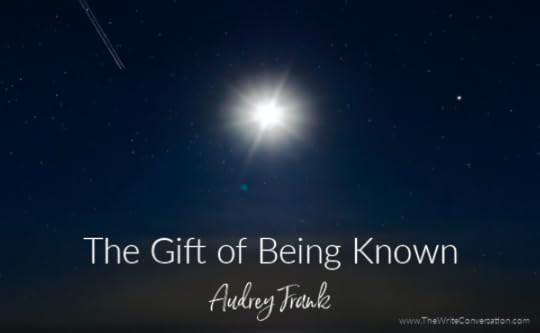
by Audrey Frank @AudreyCFrank
What we are is known to God. 2 Corinthians 5:11
“May it happen to me as you have said.” -Mary, mother of Jesus, upon the news of her immaculate conception (Luke 1:38).
Hidden among the gifts piled high under the Christmas tree of Calvary lies a small package easily missed in the tumult of sparkling paper and silver bows. If you find it, inside you will discover a signet ring, your own name engraved within its golden arc.
Along the crest of the signet is one word:
Known.
This gift, meant for you, was officially sealed by the One who came at Christmastime.
What we are is known to God.
We are known!
The brilliance reflected from this gift may intimidate. The flash of truth when it catches the light may temporarily blind you with fear.
But if you will try this ring on your finger, the finger that pounds the keys seeking to write the words God gives, you will find it fits perfectly. For His knowledge of you and me is perfect, complete. He is not afraid of who we are. All of it.
And it is from this place of complete knowing that God reveals our life purpose.
Christmas came through a girl who was willing to believe God knew her better than she knew herself.
The virgin’s name was Mary. The angel went to her and said, “Greetings, you who are highly favored! The Lord is with you.” Luke 1:27-28
God knew Mary. She was known far beyond the facts we all list from memory on Christmas Eve, the virgin, the teenager, the betrothed. The Jew, the girl, the simple villager. Mary was known by God far beyond what she knew and understood about herself.
And Mary was loved.
You, dear purposed one, are known. And you are also loved.
Mary was greatly troubled at his words and wondered what kind of greeting this might be. Luke 1:29
Mary’s first response to such big knowing was fear, and it’s no wonder. The calling of God is fearsome. He asks more of us that we think ourselves capable. He asks the impossible, really. We think we know ourselves. And we know we can’t do that thing He’s asking us to do.
But the angel said to her, “Do not be afraid, Mary; you have found favor with God” (v. 30).
There it is for the second time in those messenger-words, that word favor. What does favor have to do with fear?
The Greek word is charis , implying a state of love, kindness, and favor toward someone with a focus on a benefit or gift given to them specifically.
Charis takes being known to a higher level. This isn’t just knowledge, this is loving knowledge. Kind knowledge. Knowledge with a sparkly present in its hand just for the one who is known. To be loved steadfastly, to have impossible-seeming purpose declared to us by a Giver who is kind and focused on our specific benefit is mind-blowing. And growing. And transforming.
Suddenly Mary’s fear is pushed aside by clumsy, blubbering, belly-laughing hope.
I can imagine her face the moment the thought occurred to her.
He actually chose me for that.
Mary changed her mind about what she thought she knew. She decided to trust that God knew her better than she knew herself and He would fulfill His purpose in her. She accepted the first Christmas gift, that of being known and loved.
That reminds me of some oft-repeated words, worn smooth by the passage of time.
For God so loved the world that he gave his one and only Son, that whoever believes in him shall not perish but have eternal life. John 3:16
Christmas reminds us that in God’s eyes, being known and being loved may just be the same thing.
Lord, may it happen to me as you have said. Amen.
Wonder what the One who knows and loves you might be calling you to do? Click here to enjoy my Christmas gift to you, Known, a 3-day Bible Study for curious writers.
Known Bible Study - PDF version Known Bible Study - epub version
TWEETABLEThe Gift of Being Known from author @AudreyCFrank on @EdieMelson (Click to Tweet)
 Audrey Frank is an author, speaker, and storyteller. The stories she shares are brave and true. They give voice to those whose words are silenced by shame, the hard things in life that don’t make sense, and the losses that leave us wondering if we will survive. Audrey and her family have spent over twenty years living and working among different cultures and world views, and she has found that God’s story of redemption spans every geography and culture. He is the God of Instead, giving honor instead of shame, gladness instead of mourning, hope instead of despair. Although she has three different degrees in communication and intercultural studies, Audrey’s greatest credential is that she is known and loved by the One who made her.
Audrey Frank is an author, speaker, and storyteller. The stories she shares are brave and true. They give voice to those whose words are silenced by shame, the hard things in life that don’t make sense, and the losses that leave us wondering if we will survive. Audrey and her family have spent over twenty years living and working among different cultures and world views, and she has found that God’s story of redemption spans every geography and culture. He is the God of Instead, giving honor instead of shame, gladness instead of mourning, hope instead of despair. Although she has three different degrees in communication and intercultural studies, Audrey’s greatest credential is that she is known and loved by the One who made her.Audrey is the author of Covered Glory: The Face of Honor and Shame in the Muslim World (Harvest House Publishers), an outpouring of Audrey’s heart to introduce others to the God of Instead. Shame is not unique to the developing world, the plight of the women behind veils, young girls trafficked across borders; shame is lurking in hearts everywhere. Through powerful stories from women around the world, Covered Glory illuminates the power of the Gospel to remove shame, giving honor instead. Available at favorite booksellers: BARNES & NOBLE , BOOKS A MILLION, AMAZON.
Featured Image: Photo by Caleb Stokes on Unsplash
Published on December 03, 2022 22:00
December 2, 2022
3 Reasons Why It's So Hard to Be a Writer
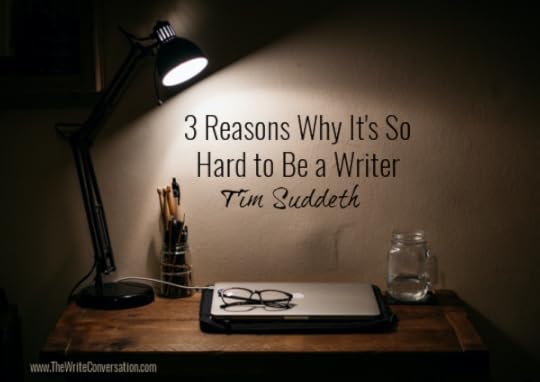
by Tim Suddeth @TimSuddeth
Why is writing so hard?
I mean, all you do is string a bunch of words together. Easy peasy, right? My three-year-old niece can do it.
Of course, Red Smith, a Pulitzer-Prize-winning sportscaster (think about that), had a different view. “Writing is easy. All you have to do is sit down at the typewriter, cut open a vein, and bleed.”
A little gross, but I get it. (And I wonder if my editor would make Pulitzer-Prize-winning Red take out down in the above sentence.)
Which takes us back to why writing can be so hard.
Now, I grew up on a farm. Work is planting trees, gathering bales of hay, moving baskets of peaches. Work is supposed to make you sweat. That’s why sometimes (okay, often) emptying the laundry basket or mowing the grass slips before writing. The empty basket or the freshly cut lawn is something I can see.
I identify with the story of the host who asked his guest, Oscar Wilde, what he did one morning. Wilde responded he had spent the day in hard literary work. The host asked what he had done.
“I was working on the proof of one of my poems all morning and took out a comma.”
His host puffed on his pipe. “And in the afternoon?”
“In the afternoon, well, I put it back again.”
I can identify with this. And the fatigue and angst that Wilde’s struggle required. It takes a lot of effort to build, mold, and polish a sentence or paragraph, just to cut it out later.
English author Neil Gaiman understood. He said, “Being a writer is a very peculiar sort of a job: it’s always you versus a blank sheet of paper and quite often the blank sheet of paper wins.”
I believe a certain amount of frustration is part of being a writer. (Doesn’t that just warm your heart?) Because some frustrations can be beneficial.
3 Frustrations of Being a Writer
1. Trying to find your place.
When I left work to stay home and began to write, I didn’t have a clue what that meant. My writing heroes were Max Lucado and John Grisham. There’s quite a gap between my life and theirs. Think of the Grand Canyon. Think Earth to Mars.
So, what should my life as a writer look like?
As I’ve written many times here, one of the best things I did as a young writer was to find a local writing group that met in person. And I think meeting in person was important. I needed to see that real people like me were finding ways to use and grow their talent. I didn’t know how many avenues there were out there for writers. And when we went around the room telling successes, even the rejections, it showed me the opportunities that are out there.
Whether it’s ACFW, Word Weavers, or something else, I would highly recommend finding a group of local writers.
2. Trying to copy the story in your head.
Any writing or story begins with a seed of an idea in someone’s head. Whether it’s a dream or a bunch of synapses firing while you’re staring at the wall, every story begins with an idea. Then we take that picture in our heads and try to put it on paper. Hahaha. How foolish can we be?
But it’s amazing how with time and work, we begin to find clarity with our story. Sometimes the story becomes clearer, sometimes we discover the story changing. Often, my ultimate story differs greatly from the idea, but that’s okay. The finished story is worth sharing.
3. Trying too hard to meet expectations.
It is so easy, whether for a new or an experienced writer, to think they should be at a certain level or met certain goals. I mean, look at who won the award. Really?
Or, look at the following so-and-so has on social media. Well, I should...
Yeah. You never win the game of comparisons. The green monster of envy. Your brain always picks someone it believes is ‘ahead of you’ (Whatever that means.).
My social media numbers exist, but that’s about all they’re doing. I’m told by ‘them’ that my numbers aren’t good enough. My twitter account is for the birds.
But a cool thing happened last week. One of Hallmark’s stars started following me. How cool is that?
I don’t care how many people she follows, or if her account is handled by a VA, or even by a bot. I have a connection with the star of the movies my wife and I like to watch.
When you think about it, why should writing be any different from life? And if we are writing to help our readers better understand and navigate life, shouldn’t we have the same type of experiences?
I believe the reason for much of our frustrations can be found in one of my favorite songs by Amy Grant. In her song, Mountaintop, she sang that she wished she could stay on the top of the mountain fellowshipping with the Lord. But that wasn’t where God wanted her to stay. She had to come down so she can tell others they could go to the mountain, too.
Our frustrations may be like that. Through our work and struggles, our wanting to quit or throw the laptop out a window (Or so I’ve heard.), we understand what our readers are going through. And we can show them why the struggle and journey are worth all the frustration.
TWEETABLE3 Reasons Why It's So Hard to Be a Writer, insight from writer @TimSuddeth on @EdieMelson (Click to Tweet)
 Tim Suddeth is a stay-at-home dad and butler for his wonderful, adult son with autism. He has written numerous blogs posts, short stories, and three novels waiting for publication. He is a frequent attendee at writers’ conferences, including the Blue Ridge Mountain Christian Writers Conference and a member of Word Weavers and ACFW. He lives near Greenville, SC where he shares a house with a bossy Shorky and three too-curious Persians. You can find him on Facebook and Twitter, as well as at www.timingreenville.com and www.openingamystery.com.
Tim Suddeth is a stay-at-home dad and butler for his wonderful, adult son with autism. He has written numerous blogs posts, short stories, and three novels waiting for publication. He is a frequent attendee at writers’ conferences, including the Blue Ridge Mountain Christian Writers Conference and a member of Word Weavers and ACFW. He lives near Greenville, SC where he shares a house with a bossy Shorky and three too-curious Persians. You can find him on Facebook and Twitter, as well as at www.timingreenville.com and www.openingamystery.com.Featured Image: Photo by Beth Jnr on Unsplash
Published on December 02, 2022 22:00
December 1, 2022
Goal-Setting for Authors and Why It Matters

by A.C. Williams @ACW_Author
Authors have all sorts of goals. Have you noticed that? We want to write an impossible number of books and articles. We want to reach massive numbers of people with our social media and email platforms. We want to achieve great success in our speaking and teaching. And we want to have healthy families, healthy minds and bodies, and still have enough energy left to decorate our homes, prepare beautiful meals, travel the world, and spend extra moments in coffee shops sipping lattes.
Let’s be honest now. Do you know anyone (author or not) who accomplished all of that in 2022? I don’t.
Setting realistic goals has always been a challenge for me. I’m usually too optimistic about how many projects I can actually accomplish in a given time span. I used to think that goal setting was something you could just sit down and do. Decide what you want to accomplish in a year and do it. But as I’ve gotten older and busier, there’s more to do and it seems like less time to get it done, and before you know it, you’ve got a goal list that’s longer than you are and no chance of getting it all done in the time you allotted.
I’ve come to believe that setting realistic goals is a process, and it’s different for everyone. We each have to learn where our boundaries are, and that’s not just something you grab out of thin air. It takes trial and error and grace. So much grace, not just for the people around you but for yourself as well.
It’s different from year to year too. You aren’t the same person in December that you were in January. Your boundaries aren’t the same either. So you’ve got to adjust before the next year arrives, otherwise you’ll be doomed to repeat the same mistakes you made this year. We need to learn from our choices, whether they had good results or bad ones.
In the process of learning how to set goals, I’ve learned the best yearly plans have little to do with a task list and everything to do with my personal resilience.
Before you set any goals, you must look back at your year and ask what worked and what didn’t. And be honest about it. Because not everything worked. Some of the things you thought were essential weren’t essential at all. Some of the things you thought didn’t matter became your priority. How did you handle that mindset shift? Because if there’s one thing that stays the same in goal setting from year to year, it’s that nothing you expect will happen exactly the way you expect it.
Having a plan is great, but it’s more important to be able to bounce back and stay on target when life doesn’t go to plan.
Can you bounce back from the unexpected? Have you planned margin and extra space into your life to accommodate the unexpected? It’s one thing to make a detailed plan for your week; it’s something else to still be able to accomplish your important goals after your week spontaneously combusts.
So how do you plan for unexpected things? How do you plan for your plans to go wrong? How can you adjust your life to accommodate for illness or inflation or soaring gas and grocery prices? If you’re on deadline, how do you maintain your pace and take care of a sick family member? If you have to move houses suddenly, how do you protect your creative energy?
None of those questions have easy answers, and none of those answers are the same. But they do share one common concept, and that is individual mental and emotional health.
You’ve got to know your boundaries. You’ve got to know where your lines are drawn, and you’ve got to choose to protect those parts of your life. If your mental or emotional health is suffering, you can’t make wise decisions. You can’t bounce back. And you’ll focus on accomplishing things that don’t really matter.
So before you sit down to set your goals for next year, think about this year. Think about what went wrong, and think about how you handled it. That’s not to make yourself feel guilt or shame over how poorly you did. This needs to be an honest assessment of your soul, your mind, your choices, and your results.
Do you want to repeat this year? Or are there some things you want to change? Decide now, because those elements won’t change just because you want them to. Change takes effort.
If you need an outside perspective, sit down with a friend and go over your year together. It often helps to have another pair of eyes that can keep you honest.
Yes, make smart goals. Yes, invest in a planning system that works for you. But more than anything, beyond what you want to accomplish next year, understand why it matters and be ready to adjust your plans when they don’t go the way you expect.
In the end, the plan isn’t the point.
TWEETABLEGoal-Setting for Authors & Why It Matters, insight from author @ACW_Author on @EdieMelson (Click to Tweet)
 Award-winning author, A.C. Williams is a coffee-drinking, sushi-eating, story-telling nerd who loves cats, country living, and all things Japanese. She’d rather be barefoot, and if she isn’t, her socks won’t match. She has authored eight novels, two novellas, three devotional books, and more flash fiction than you can shake a stick at. A senior partner at the award-winning Uncommon Universes Press, she is passionate about stories and the authors who write them. Learn more about her book coaching and follow her adventures online at https://www.amycwilliams.com.
Award-winning author, A.C. Williams is a coffee-drinking, sushi-eating, story-telling nerd who loves cats, country living, and all things Japanese. She’d rather be barefoot, and if she isn’t, her socks won’t match. She has authored eight novels, two novellas, three devotional books, and more flash fiction than you can shake a stick at. A senior partner at the award-winning Uncommon Universes Press, she is passionate about stories and the authors who write them. Learn more about her book coaching and follow her adventures online at https://www.amycwilliams.com.
Published on December 01, 2022 22:00



